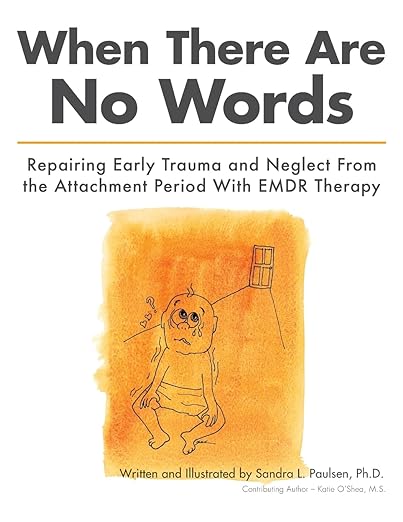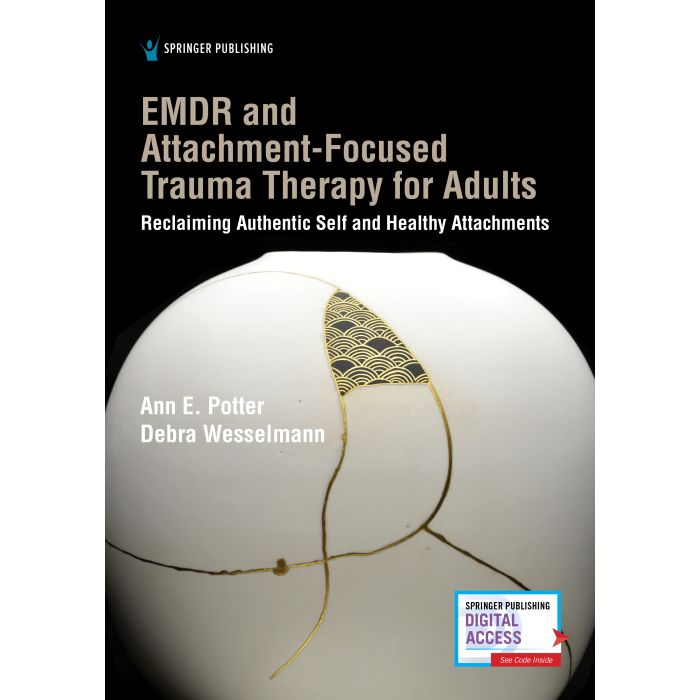When There Are No Words: Repairing Early Trauma and Neglect From the Attachment Period With EMDR Therapy
Book on treating early trauma & neglect in the attachment period. Geared to EMDR therapists, clients will connect with cartoon illustrations.
About the Book
“This book, intended for clinicians treating very early trauma and neglect in the attachment period, integrates several treatment strategies in a comprehensive and resonant approach that is attuned to the client’s unspoken early experience. Although the book presumes EMDR training, it has considerable application for other clinicians who deal with the pernicious effects of early trauma and neglect in the attachment period. The book is based on the seminal contributions of Katie O’Shea, and integrates the author’s understanding of complex trauma, dissociative disorders, and the neurobiology of traumatic dissociation, including Panksepp, Porges, Schore, and others. It draws upon the somatic therapy traditions of Peter Levine and others for accessing the somatically held unprocessed trauma responses. Although primarily for clinicians, the cartoons are also suitable for use with clients. Like the author’s first book on dissociation, the lay public will be interested in the book because its cartoons make the information comprehensible. The early trauma approach in its basic form consists of 1) containment, 2) safe state, 3) resetting hardwired subcortical affective circuits and 4) clearing trauma by time frame for temporal integration. For complex cases, each step has ego state variations and there are more preparatory steps to ensure the self system is aligned with treatment goals. It integrates ego state work to reduce loyalty to the aggressor and the problem of perpetrator introjects. The author was a collaborator of the late father of ego state therapy, John G. Watkins, Ph.D. Sandra Paulsen offers a third integration approach, “temporal integration,” to supplement the “tactical integration” and “strategic integration” approaches of Catherine Fine, Ph.D. and Richard Kluft, M.D., respectively. The book has over a hundred original drawings by the author, which telegraph complex psychological and neurobiological concepts quickly, making the book a quicker read than would otherwise be possible. The format, with its generous use of bullets, white space and cartoons, mean that a range of readers can scan the chapters for the information relevant to their own needs. Appendices provide detailed information on the mechanics of the work, how to ethically work in the intensive format, containment procedures for complex cases, working with perpetrator introjects. Although the book is informal with its use of cartoons, the book includes relevant scholarly citations and references. Because it is both metaphoric and scholarly, it speaks to both the right and left hemisphere’s of the reader’s brain. Many concepts will slip in unawares through the compelling use of metaphor. The book includes case examples to illustrate the suggested scripting for accomplishing each of the relevant steps. Narrative discussion describes the most likely problems for each step and what to do about them. Katie O’Shea, M.S., is acknowledged as contributing author because of her development of the original approach and some of the ideas contained in the book. Ulrich Lanius, Ph.D. contributed to the neurobiological understandings in the book. Above all, the author’s goal is to help others understand how the story tells itself non-verbally, when trauma occurs in the attachment period and is held in implicit memory. When we hear of the story in the non-verbals, clinicians can “catch and release” the traumatic sequelae of very early trauma and neglect. The book includes worksheets for clinicians use. It supplements the online workshops that Dr Paulsen presents on this same topic, and others, see www.bainbridgepsychology.com.”
—Description from publisher
Book Access
Purchase/Subscription Required
Paulsen, S. & O’Shea, K. (2017). When there are no words: Repairing early trauma and neglect from the attachment period with EMDR therapy. CreateSpace Independent Publishing Platform.
- ISBN: 978-1507507193
Date
January 24, 2017
Creator(s)
Sandra L Paulsen
Contributor(s)
Katie O'Shea
Topics
Attachment, Dissociation
Extent
235 pages
Publisher
CreateSpace Independent Publishing Platform
APA Citation
Paulsen, S. & O’Shea, K. (2017). When there are no words: Repairing early trauma and neglect from the attachment period with EMDR therapy. CreateSpace Independent Publishing Platform.
Audience
EMDR Therapists, General/Public, Other Mental Health Professionals
Language
English
Content Type
Book
Access Type
External Resource





